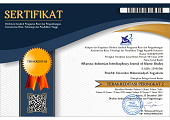Nilai-Nilai Perdamaian dalam Buku Teks Pendidikan Agama Islam (Akhlak) di Sekolah Muhammadiyah
Abstract
Keywords
Full Text:
PDFReferences
Abdur Rozaq, Muhammad. 2014. Pendidikan Akhlak SMA/SMK/MA MuhammadiyahKelas 11, Yogyakarta: Majelis Dikdasmen PWM DIY.
Davies, L. 2006. Global citizenship: abstraction or framework for action?, Educational Review, 58 (1), hal. 5-25.
Davies, L. 2005. “Schools and war: urgent agendas for comparative and international education”, Compare, Vol. 35, No. 4, December, hal. 57–371.
Davies, L. 2008. Educating Against Extremism, USA: Trentham Books Limited.
De Rivera, J. 2009. “Assessing the Peacefulness of Cultures” dalam de Rivera, J. (Ed.). Handbook on Building Cultures of Peace, USA: Springer.
Fell, G. 1998. “Peace” dalam Hicks, D. Education for Peace: Issues, Principles and Practice in the Classroom, London: Routledge.
Harber, C dan Sakade, N. 2009. Schooling for violence and peace: how does peace education differ from ‘normal’ schooling? Journal of Peace Education, Vol. 6 (2), September, h. 171–187.
Hasballah, 2003. Perkelahian Pelajar: Potret Siswa SMU di DKI Jakarta, Jakarta: Galang Press.
Jannah, A.N. 2014. Pendidikan Akhlak SMA/SMK/MA Muhammadiyah Kelas 10, Yogyakarta: Majelis Dikdasmen PWM DIY.
Khaeruddin dan Junaedi, M. 2007. Kurikulum Tingkat Satuan Pendidikan: Konsep dan Implementasinya di Madrasah, Ygyakarta: MDC Jateng dan Pilar Media.
Khan, M. W. 2009. The Prophet of Peace: Teachings of the Prophet Muhammad, India: Penguin Books.
Margito dan Abdur Rozaq, M. 2014. Pendidikan Akhlak SMA/SMK/MA Muhammadiyah Kelas 12, Yogyakarta: Majelis Dikdasmen PWM DIY.
Muslich, M. 2009. KTSP: Dasar Pemahaman dan Pengembangan Cetakan Kelima, Jakarta: Bumi Aksara.
Muthali’in, A. 2001. Bias Gender dalam Pendidikan, Surakarta: Muhammadiyah University Press.
Nurwanto. 2013. “The Portrait of gender justice and injustice in the Islamic teaching teaxtbook and Muhammadiyah teachers’ responses”, Indonesian Journal of Islam and Muslim Societies, Vol. 3 (1), June, hal. 149-173.
Sairin, W. 2014. Referensi Yuridis (Peraturan Perundang-Undangan) Kurikulum 2013, Bandung: Yrama Widya.
Soeharto, B. 2013. Menangani Konflik di Indonesia, Jakarta: Kasta Hasta Pustaka.
Tim Pengembang Kurikulum. 2012. Kurikulum Pendidikan Al-Islam, Kemuhammadiyahan dan Bahasa Arab (ISMUBA) SMA/SMK/MA Muhammadiyah, Yogyakarta: Majelis Dikdasmen PWM DIY.
Van Klinken, G. 2007. Perang Kota Kecil: Kekerasan Komunal dan Demokratisasi di Indonesia, Jakarta: Yayasan Obor Indonesia dan KITLV-Jakarta
DOI: https://doi.org/10.18196/aiijis.2015.0043.41-65
Refbacks
- There are currently no refbacks.
Copyright (c) 2015 Afkaruna: Indonesian Interdisciplinary Journal of Islamic Studies

This work is licensed under a Creative Commons Attribution-ShareAlike 4.0 International License.
Afkaruna: Indonesian Interdiciplinary Journal of Islamic Studies indexed by:












1.png)


